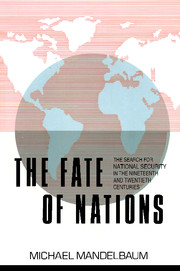Book contents
- Frontmatter
- Contents
- Acknowledgments
- A Note on Sources and Citations
- Introduction
- 1 Collective Approaches to Security: The Nineteenth-Century Managed Balance of Power System and Great Britain
- 2 France, 1919–1940: The Failure of Security Policy
- 3 The United States, 1945–1980: The Natural History of a Great Power
- 4 China, 1949–1976: The Strategies of Weakness
- 5 Israel, 1948–1979: The Hard Choices of the Security Dilemma
- 6 Collective Approaches: The International Economic Order and Japan, 1945–1985
- Index
1 - Collective Approaches to Security: The Nineteenth-Century Managed Balance of Power System and Great Britain
Published online by Cambridge University Press: 20 May 2010
- Frontmatter
- Contents
- Acknowledgments
- A Note on Sources and Citations
- Introduction
- 1 Collective Approaches to Security: The Nineteenth-Century Managed Balance of Power System and Great Britain
- 2 France, 1919–1940: The Failure of Security Policy
- 3 The United States, 1945–1980: The Natural History of a Great Power
- 4 China, 1949–1976: The Strategies of Weakness
- 5 Israel, 1948–1979: The Hard Choices of the Security Dilemma
- 6 Collective Approaches: The International Economic Order and Japan, 1945–1985
- Index
Summary
In the eighteenth century there was a balance of power in Europe. Although the leading states were not precisely equal in strength, none so far outstripped the others as to be able to subdue them and dominate the Continent. Each state pursued its own interests, which meant that each strove to expand its power and influence, chiefly by increasing the territory and population under its control. None was so successful that it gained mastery over the others.
One or another of the European powers had from time to time threatened to achieve dominance: first the Spanish, then the German Hapsburgs, then Louis XIV of France. On each occasion the lesser states came together to thwart the power seeking hegemony. The threat of domination produced an opposing coalition, which, after defeating the state making the bid for mastery, dissolved into uncoordinated rivalries for territory and influence.
The European powers did not design their foreign policies so as to contrive equilibrium among themselves. The coalitions that formed to thwart efforts to dominate the Continent arose not from a grand Europe-wide scheme but rather from the uncoordinated pursuit by each power of its own interest, which was defined, even above self-aggrandizement, as independence. The balance of power was the unintended outcome of these individual strivings. Rousseau described it as a kind of mechanical marvel: “The actual system of Europe has precisely the degree of solidity which maintains it in a constant state of motion without upsetting it.
- Type
- Chapter
- Information
- The Fate of NationsThe Search for National Security in the Nineteenth and Twentieth Centuries, pp. 8 - 71Publisher: Cambridge University PressPrint publication year: 1988

